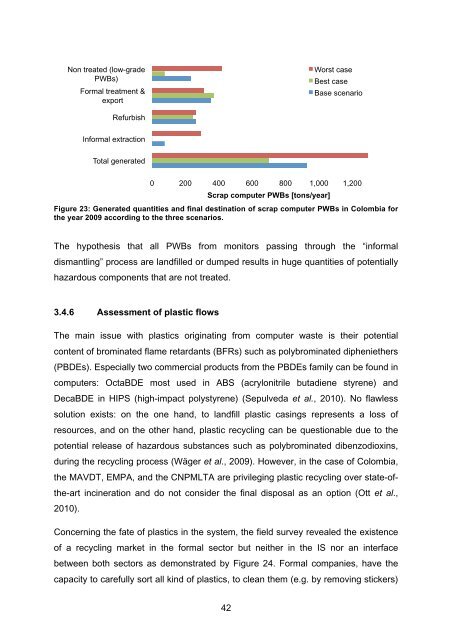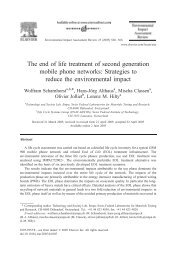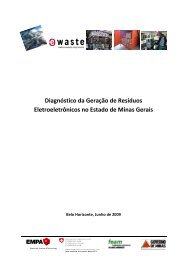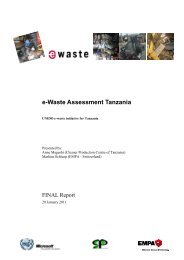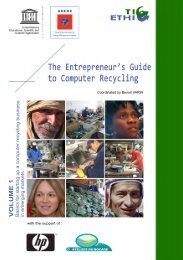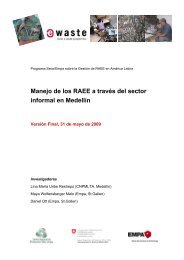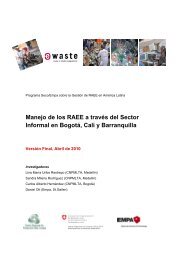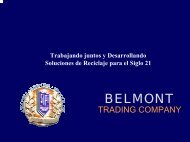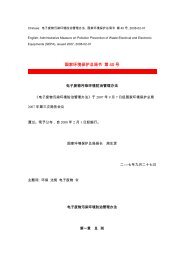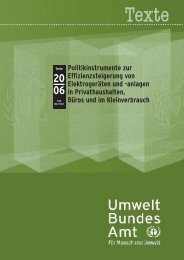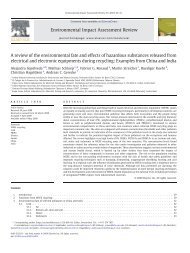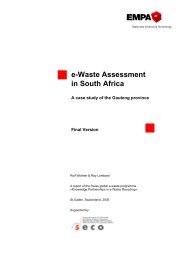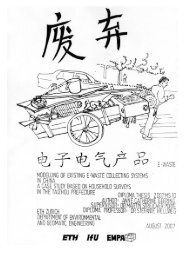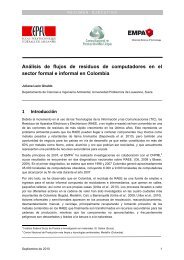10 07 29 Master thesis Juliana Leon - e-Waste. This guide
10 07 29 Master thesis Juliana Leon - e-Waste. This guide
10 07 29 Master thesis Juliana Leon - e-Waste. This guide
Create successful ePaper yourself
Turn your PDF publications into a flip-book with our unique Google optimized e-Paper software.
Non treated (low-grade<br />
PWBs)<br />
Formal treatment &<br />
export<br />
Worst case<br />
Best case<br />
Base scenario<br />
Refurbish<br />
Informal extraction<br />
Total generated<br />
0 200 400 600 800 1,000 1,200<br />
Scrap computer PWBs [tons/year]<br />
Figure 23: Generated quantities and final destination of scrap computer PWBs in Colombia for<br />
the year 2009 according to the three scenarios.<br />
The hypo<strong>thesis</strong> that all PWBs from monitors passing through the “informal<br />
dismantling” process are landfilled or dumped results in huge quantities of potentially<br />
hazardous components that are not treated.<br />
3.4.6 Assessment of plastic flows<br />
The main issue with plastics originating from computer waste is their potential<br />
content of brominated flame retardants (BFRs) such as polybrominated dipheniethers<br />
(PBDEs). Especially two commercial products from the PBDEs family can be found in<br />
computers: OctaBDE most used in ABS (acrylonitrile butadiene styrene) and<br />
DecaBDE in HIPS (high-impact polystyrene) (Sepulveda et al., 20<strong>10</strong>). No flawless<br />
solution exists: on the one hand, to landfill plastic casings represents a loss of<br />
resources, and on the other hand, plastic recycling can be questionable due to the<br />
potential release of hazardous substances such as polybrominated dibenzodioxins,<br />
during the recycling process (Wäger et al., 2009). However, in the case of Colombia,<br />
the MAVDT, EMPA, and the CNPMLTA are privileging plastic recycling over state-ofthe-art<br />
incineration and do not consider the final disposal as an option (Ott et al.,<br />
20<strong>10</strong>).<br />
Concerning the fate of plastics in the system, the field survey revealed the existence<br />
of a recycling market in the formal sector but neither in the IS nor an interface<br />
between both sectors as demonstrated by Figure 24. Formal companies, have the<br />
capacity to carefully sort all kind of plastics, to clean them (e.g. by removing stickers)<br />
42


